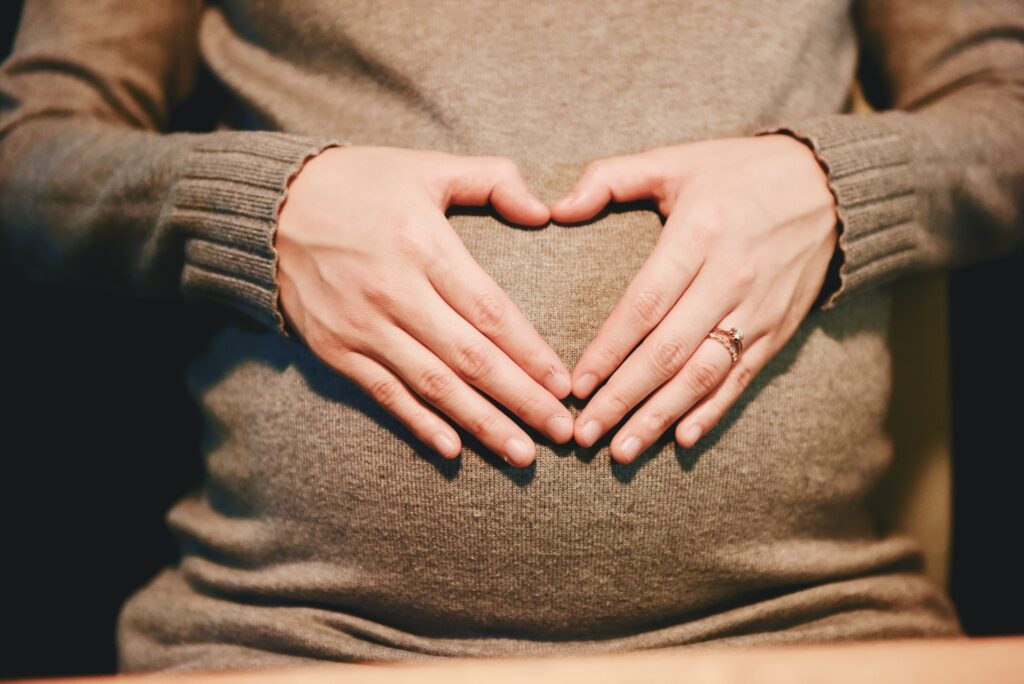Pregnancy
Pregnancy is a time when women should take extra care of themselves to ensure the proper development of the fetus and their health. During pregnancy, a woman will require slightly more calories than usual and more micronutrients that will help the baby develop properly. Some foods are indicated, while some are contraindicated. This guide aims to present nutritional advice for pregnant women.
Food recommendations for pregnant women
The Institute of Medicine and National Research Council recommends that women during pregnancy should gain in total (1):
- „Underweight women, who have a body mass index (BMI) below 18.5, should gain 28 to 40 lbs. (12.7 to 18.1 kilograms).
- Normal-weight women, who have a BMI of 18.5 to 24.9, should gain 25 to 35 lbs. (11.3 to 15.9 kg).
- Overweight women, who have a BMI of 25.0 to 29.9, should gain 15 to 25 lbs. (6.8 to 11.3 kg).
- Obese women, who have a BMI of 30.0 and above, should gain 11 to 20 lbs. (5 to 9.1 kg).”
When pregnant with twins, the recommendations are:
- „Underweight: 50 to 62 lbs. (22.7 kg to 28.1 kg)
- Normal weight: 37 to 54 lbs. (16.8 to 24.5 kg)
- Overweight: 31 to 50 lbs. (14.1 to 22.7 kg)
- Obese: 25 to 42 lbs. (11.3 to 19.1 kg)”
When it comes to calorie intake, according to Krieger (2), women are typically advised to add ~200kcal to their calorie intake during the second trimester and ~300 kcal during the third trimester.
The recommendations relating to food consumption are(3):
- Include dairy products as they contain protein, calcium, phosphorus, B vitamins, magnesium and zinc
- Legumes as they are a plant-based source of protein, fibre iron, folate and calcium
- Sweet potatoes are rich in beta-carotene, which is further converted into vitamin A
- Salmon as it contains omega-3 fatty acids
- Eggs. One egg can supply the body with approximately 147g of Choline, where the current recommendations are that during pregnancy a typical woman should consume 450mg of choline per day
- Dark, leafy greens that supply the body with nutrients such as fibre, vitamin C, K, A, calcium, iron, folate and potassium
- Lean, red meats as they are high in protein, iron, choline and B vitamins
- Berries and fruits as they contain healthy carbohydrates, vitamin C, fibre, antioxidants and polyphenols
- Whole grains are a source of fibre and a broad range of vitamins, an example could be quinoa which contains high-quality protein(4), B vitamins, fibre and magnesium
- Avocados, which are high in monounsaturated fatty acids, are generally healthy and have anti-inflammatory properties(5) and fibre, B vitamins, vitamin K, potassium, copper, vitamins E & C
- Dried fruits are a source of fibre and a variety of micronutrients. Their advantage over the fresh fruit is that they do not contain water, so they can be stored for longer and are easier to consume due to their smaller volume
- Fatty fish or fish oil, which is a source of eicosapentaenoic acid (EPA) and docosahexaenoic acid (DHA) that are omega-3 fatty, which can indeed be created from alpha-linolenic acid, but the conversion rate is very inefficient, especially when it comes to DHA conversion(6)
- A lot of water during the pregnancy blood volume significantly increases(7), which increases the water requirements
To summarise, the general advice is to consume more nutrient-dense foods and water as during pregnancy requirements for water and micronutrients increase. Pregnant women should also avoid fast foods and fish that are high in mercury, excess caffeine intake, raw meats and fish along with unwashed products and alcohol as mercury can be toxic even in small amounts, raw and unwashed products may be contaminated with harmful bacteria, large amounts of caffeine increase the risk of restricting the growth of fetus and alcohol is generally harmful and can cause problems for the baby during pregnancy.
References:
- Kathleen M. Rasmussen & Ann L. Yaktine (2009) Weight Gain During Pregnancy – Reexamining Guidelines, USA: The National Academies Press
- Nierenberg, Carl & Wild, Sarah, Pregnancy diet & nutrition: What to eat, what not to eat, accessed on 08/05/21, available at: https://www.livescience.com/45090-pregnancy-diet.html
- Healthline, 13 Foods to Eat When You’re Pregnant, accessed on 08/05/21, available at: https://www.healthline.com/nutrition/13-foods-to-eat-when-pregnant
- J. Ruales, B. M. Nair (1992), Nutritional quality of the protein in quinoa (Chenopodium quinoa, Willd) seeds, available at: https://pubmed.ncbi.nlm.nih.gov/1546052/
- Mikel Theobald, 8 Anti-Inflammatory Foods for Multiple Sclerosis, accessed on 08/05/21, available at: https://www.everydayhealth.com/multiple-sclerosis/anti-inflammatory-foods-ms
- Helga Gerster (1997), Can adults adequately convert alpha-linolenic acid (18:3n-3) to eicosapentaenoic acid (20:5n-3) and docosahexaenoic acid (22:6n-3)? available at: https://pubmed.ncbi.nlm.nih.gov/9637947/
- Monika Savanghavi & John D. Rutherford (2014), Cardiovascular Physiology of Pregnancy, available at: https://www.ahajournals.org/doi/full/10.1161/circulationaha.114.009029




